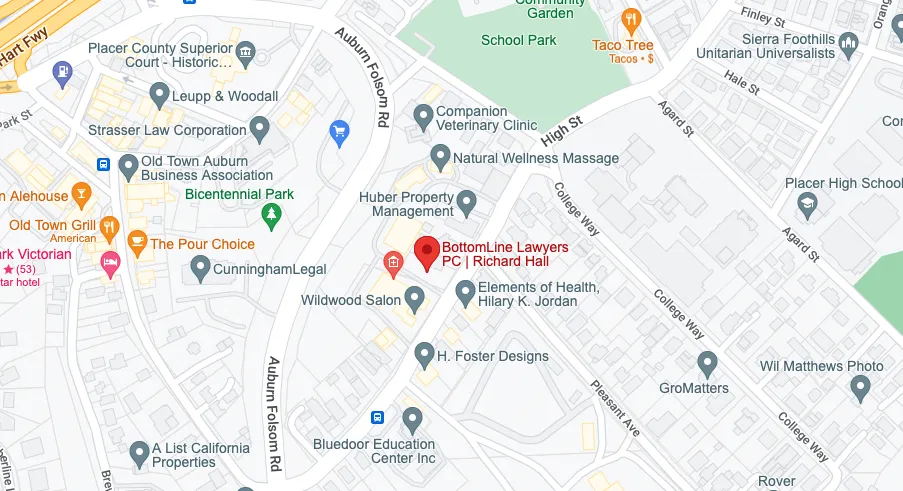Bankruptcy Attorney in Auburn, California
People who want to file for Chapter 7 bankruptcy must pass the means test after the modifications to the bankruptcy legislation were implemented in October 2005. The goal of this test is to identify whether a person has adequate discretionary income to pay off any of their debts. Your income, expenses, and total debt amount are all considered in this complicated formula.
Our Auburn bankruptcy attorneys at the law office of BottomLine Lawyers are well-versed in the means test. In Chapter 7 bankruptcy, we have assisted hundreds of residents in Auburn, California, to eliminate debt and start over financially. Find out how we can help you comprehend the bankruptcy procedure and weigh your options. Call us right away!
Why Do I Need a Bankruptcy Lawyer in Auburn, California?
Finding bankruptcy lawyers is simple, but finding bankruptcy lawyers that are committed to their work, stay on top of their game, and have the copious demonstrated experience to guide you through the process is challenging.
Numerous individuals have benefited from BottomLine Lawyers’ assistance in obtaining debt relief and financial freedom.
- We take each issue seriously.
- We recognize the uniqueness of each case to ensure we offer “outside the box” and creative solutions to our clients.
- We can expedite proceedings and produce positive results because of our extensive experience and track record in bankruptcy matters.
You require a bankruptcy law business in Auburn because your circumstances are distinct and need to be recognized. Call us right away to start the path to your new life!
What is a Chapter 7 Bankruptcy Means Test?

The bankruptcy court uses the means test, a complicated formula, to dismiss bankruptcy applications submitted wrongly under Chapter 7. There is a presumption of misuse of the Bankruptcy Code if the debtor’s income is higher than the median income level for their household in their state. The case will likely be dismissed by the court or converted to a Chapter 13 repayment plan, which offers less favorable terms if the debtor fails to dispute that inference.
However, not everyone is forced to take the means test. Furthermore, it is conceivable to refute the presumption, but doing so calls for a comprehensive factual examination far beyond the scope of our website’s vital informational objectives. Nevertheless, our goal is to give you a helpful and educational summary of this subject. Contact us for a legal consultation or complete our online examination if you want to discuss your cases in more detail.
Who is Eligible to Take the Bankruptcy Means Test?
The means test must be completed by debtors whose income is more than the median household income for their state.
Who is Exempted to Take the Bankruptcy Means Test?
- Individual debtors whose income is below the state median – These particular debtors automatically meet the requirements for Chapter 7 bankruptcy and do not need to submit to the means test. However, liquidation is still an option for any nonexempt assets.
- Veterans with disability – Disabled veterans can avoid the means test regardless of their salary.
- Active duty military servicemen and women – Both men and women serving in the military on active duty are exempt from the means test.
What is the Computation for Means Test?
- Calculate your current monthly income now (CMI).
- Determine your six-month average gross income from all sources, considering your spouse’s income in a joint case. Include any recurring payments provided by anyone who helps pay for your household expenses, such as household members. However, leave out social security.
- Establish your monthly Internal Revenue Service (IRS) guideline expenses.
- Then, use the IRS website’s spending guidelines to compute your monthly living expenses. Unfortunately, IRS guidelines expenses are significantly lower than your actual spending because they only consider necessary expenses.
- Choose Your disposable qualifying income.
- Utilizing your figures, perform the following calculation:[CMI – (IRS regulations expense) x 60] equals disposable income.
- Did you refute the presumption?
If your disposable income is less than $7,025, you can continue filing under Chapter 7 because you rebutted the presumption of abuse successfully.
There is a presumption of abuse if your disposable income is higher than $11,725. Therefore, the trustee will move to dismiss or convert your case unless there is a unique situation exonerating the abuse.
You can continue filing for Chapter 7 bankruptcy if your disposable income is more than $7,025 but less than $11,725, and you cannot pay more than 25% of your unsecured debt.
The trustee will proceed to dismiss or convert your case if you can pay more than 25% of your non-priority unsecured debt because abuse is inferred unless there is a unique circumstance extenuating the abuse.
How Do You Compute For Your Current Monthly Income (CMI)?
You will encounter the means test when you fill out the paperwork you submit to begin a Chapter 7 case. There are three bankruptcy forms in the test. However, you might not have to complete them all.
- First Bankruptcy Means Test Form – You can compute your current monthly income (CMI) and yearly income for bankruptcy reasons using the first form, the Chapter 7 Statement of Your Current Monthly Income (Form 122A-1). To begin, make a list of every dollar of gross income you received in the six entire months before the filing date of your bankruptcy.
You will pass the exam as long as you have a state median income. You must divide your gross amount by six and then multiply it by twelve to obtain the proper comparison figure before comparing it to the state’s yearly median income amount.
There will not be any more paperwork to fill out if you pass this part of the test.
- Second Bankruptcy Means Test Form – Filling out the second form, Chapter 7 Means Test Calculation, will give you a second chance to pass the means test if your salary is higher than the median family income for your state (Form 122A-2).
Allowed expenses, including rent, utilities, childcare, taxes, insurance, and tithing, will be subtracted from your annual income. Your ability to pay off debt will be determined by the computations. You will pass the examination and be eligible for a Chapter 7 discharge if you do not have much left over. If not, you should probably think about declaring Chapter 13 bankruptcy.
- Third Means Test Form – Some folks may decide not to take the means test at all. Veterans with disabilities, service personnel on active duty during specific times, and people with mostly company debt (as opposed to consumer debt) are a few examples of those excluded from the means test requirement. The final form, which is the Statement of Exemption from Presumption of Abuse Under Section 707(b), is where you will declare your exemption (2).
What Happens During the Bankruptcy Means Test?
By determining whether you have adequate money to pay back creditors, the means test restricts those who cannot pay their debts from filing for Chapter 7 bankruptcy. You will not pass if you don’t.
- The first step is to determine whether your “current monthly income” is greater or less than the median income for a family of your size in your state. Your gross monthly income multiplied by two over the previous six calendar months is your “current monthly income.”
Note that if your average income is below the median, you will pass and do not need further action. If your income is higher than the median, you will still have a chance to pass the means test since you will get a second chance to do so. - Your monthly “disposable income” is determined by subtracting all permitted monthly costs from your current monthly income. The larger your disposable income, the more likely you are ineligible for Chapter 7 bankruptcy. Alternatively, if you meet the criteria for bankruptcy, you can choose to repay your obligations through a Chapter 13 repayment plan.
The means test is only required for bankruptcy filers whose obligations are predominantly consumer bills, not company debts. You can handle this test with the aid of an Auburn bankruptcy attorney while also saving money.
Are You Able to Pay Off Your Debts with Your Disposable Income?
The computations for the means test will be trickier if your average household income is higher than the state median. To pay off at least a fraction of your unsecured obligations, such as credit card bills, you must ascertain whether you have enough disposable income left over after paying your permitted monthly costs, often known as “disposable income.”
Be aware, though, that you might be unable to deduct all of your expenses. How much you can subtract for costs, like necessities, housing, and transportation, depends on the county and metro area in which you live.
Your disposable income will be determined once the means test calculation is finished. You will not pass the means test and attain bankruptcy discharge eligible obligations through Chapter 7 bankruptcy if your disposable income is too high. You can petition for Chapter 7 bankruptcy if it does not pass the means test because your income is too low.
Once You Pass the Means Test
Remember that passing the means test does not guarantee eligibility to file for Chapter 7 bankruptcy. The court will also review the following schedules:
- Schedule J: Your Expenses
- Schedule I: Your Income
The court may move your Chapter 7 bankruptcy case to a Chapter 13 bankruptcy if these two documents indicate you have enough money left to pay your creditors.
Additionally, just because you pass the means test does not mean you should go for filing bankruptcy under Chapter 7. It just means you may.
What If You Do Not Pass the Means Test?
Think about filing for Chapter 13 bankruptcy. You must adhere to a meticulous budget supervised by the court while paying monthly installments over three to five years. Although Chapter 7 bankruptcy is preferred by most filers, Chapter 13 bankruptcy is still the best option in some situations. Examples are making up missed mortgage payments to avoid home foreclosure or repaying secured debt that will not be discharged in bankruptcy over time, like most tax and support arrears.
However, consult a lawyer before deciding on Chapter 13 bankruptcy. With the help of qualified legal advice, you might discover that you can, after all, pass the means test.
Why Is Means Testing Still Difficult?
Computing the means test is complicated. What constitutes income, what costs can be deducted, what constitutes an exclusive situation, and what constitutes non-priority unsecured obligations are just some questions that complicate the means test. If you want assistance figuring out whether you are eligible for a Chapter 7 bankruptcy, give us a call right now.
The BottomLine Lawyers’ bankruptcy attorneys can assist you right now. We serve clients looking for bankruptcy guidance and a debt discharge through Chapter 7 or Chapter 13 bankruptcy. If you get in touch with us, a Californian bankruptcy lawyer from Auburn will assess your case and review your choices.
Get a Free Consultation with our Knowledgeable Bankruptcy Attorney Now!
Being in debt may be a stressful and daunting situation, which is why the attorneys at BottomLine Lawyers are caring and knowledgeable. As a preeminent law firm in California, we help people cope with their debt issues, including credit card debt, student loans, medical bills, business debt, and more.
We take pride in using our outstanding skills and in-depth understanding of the law to offer high-quality legal support to clients who require assistance breaking the cycle of debt. Create an appointment immediately if you believe our bankruptcy lawyers in Auburn, California, can assist you in determining the best course of action. Start over and contact us for a consultation instantly!


